
Mark Thomson ’03 and Peter Mertz ’03 once shared a dorm room. Now, as leaders at biopharmaceutical companies Sanofi and Biogen, they share an industry in Cambridge, Mass. Their offices are separated by mere blocks in what is often called “the most innovative square mile on the planet.”
The two had a chance to share their career journeys and reconnect with their alma mater during Bates’ Center for Purposeful Work’s inaugural biotechnology and pharmaceutical roadshow in October. Over a whirlwind two days during fall break, Purposeful Work brought 14 Bates sophomores and juniors around Boston to network with alumni in the biopharmaceutical industry and tour five companies: Biogen, Sanofi, Takeda Pharmaceuticals, Alexion Pharmaceuticals, and Kymera Therapeutics.
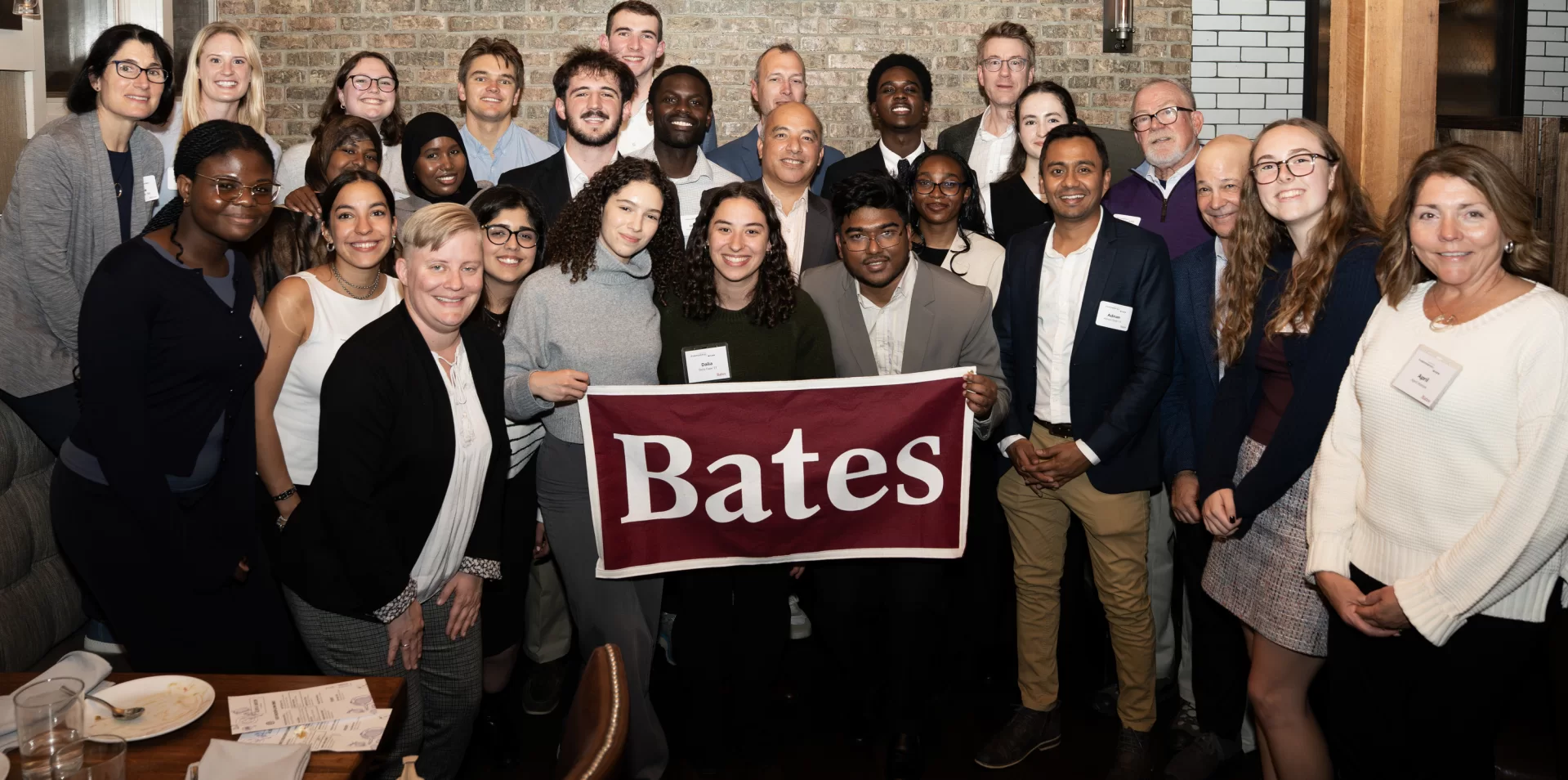
Lea Staedtler, the associate director of STEM and pre-healthcare advising with Purposeful Work, arranged the roadshow to help expose STEM-focused students to the numerous career possibilities in biopharmaceuticals.
“It’s good to know that there’s so many opportunities out there, and there’s so many things you can do with your degree, even though some of them might be unexpected,” said Nisan Ozmert ’27, a biochemistry major from Nicosia, Cyprus, who attended the roadshow.
Staedtler “did not hear a single ‘no’” as she reached out to alumni across Boston’s biopharmaceutical industry to see if they would be interested in being part of the students’ trip.
“The students seem so motivated and interested to learn more about ways in which they can start their own careers,” Thomson, who is a vice president in global immunology at Sanofi, said. “If there are aspects of my career that can be helpful in that, I’m thrilled.”
Alumni also offered key financial support for the roadshow, with a gift from Bates trustee Jeremy Chase ’91 and Christine Chase ’92 funding the majority of the trip and Max Dawson ’98, the chief operating officer at DermBiont Inc., providing lunch for students and alumni on the second day of the roadshow.
“I see tremendous value in the Center for Purposeful Work offering experiences that expose Bates students to the wide variety of careers existing in the biotechnology, pharmaceutical, and healthcare fields,” Jeremy Chase said. “I have spent most of my career investing in healthcare companies, and I am eager to support students as they explore similar career paths.”
“The students seem so motivated and interested to learn more about ways in which they can start their own careers. If there are aspects of my career that can be helpful in that, I’m thrilled.”
Mark Thomson ’03, vice president in global immunology at Sanofi
At each stop on the roadshow, enthusiasm ran high as Bates alumni and their colleagues educated students about the industry and showed them around striking state-of-the-art facilities. At Takeda, for example, panels of shimmering glass hung suspended from a vast skylight and refracted natural light as they snaked past 12 floors of offices, laboratories, conference rooms, and lounges boasting expansive skyline views. From the inside of a glass elevator creeping upward, students got a first-class view of it all.
“Going to three different companies in one day allowed me to see all the different types of cultures in each company and what you’d be looking for if you were going into a specific biotech company, what kind of pros and cons you’d consider,” said Asha Abdisamad ’27, a biochemistry major from Lewiston who is also an office assistant in Purposeful Work.
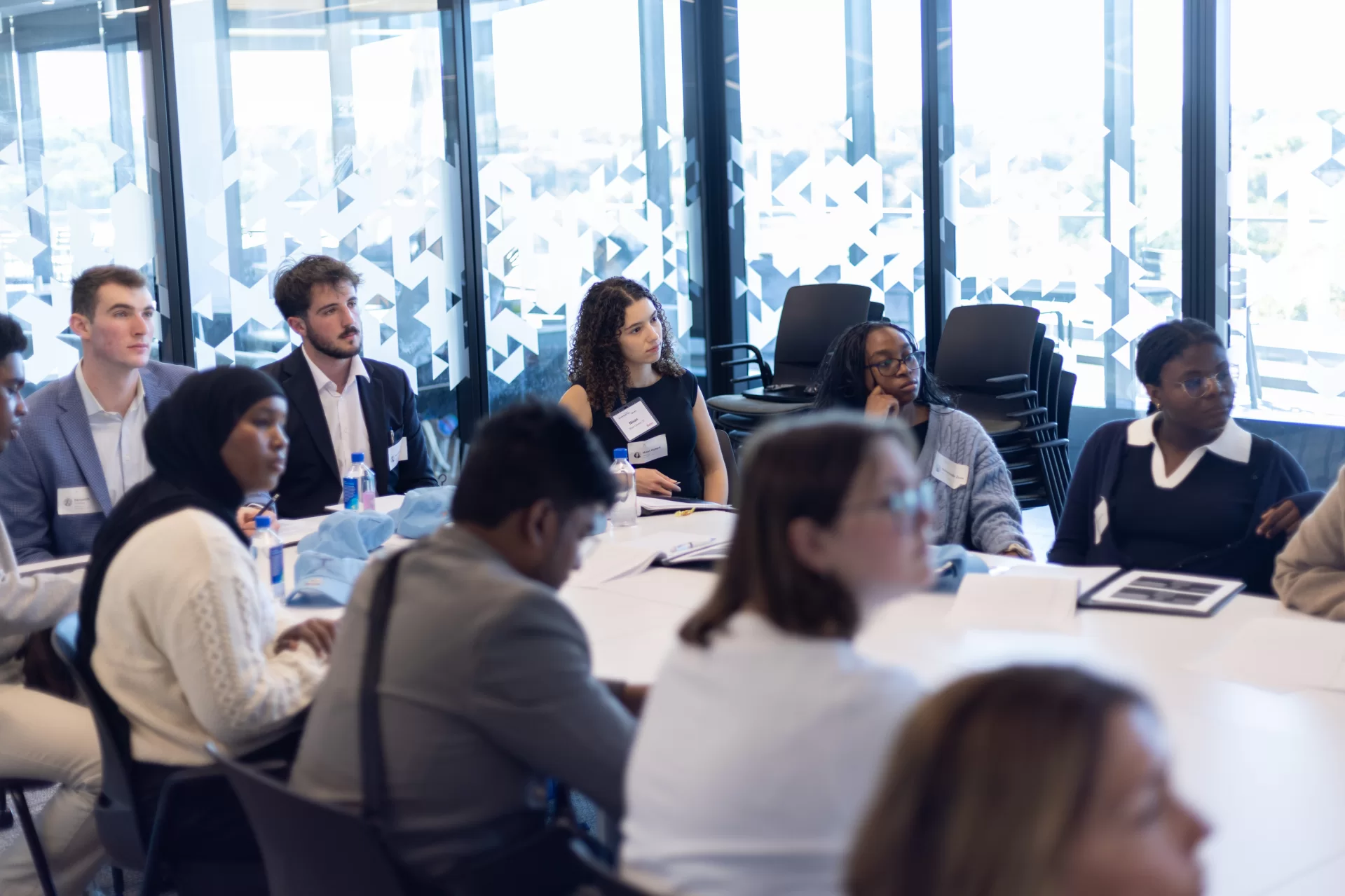
The core goal of the biopharmaceutical industry is to develop and get medicine to people who need it, but the means of doing so goes beyond scientific innovations, to incorporate law, communications, and business. Many biopharmaceutical professionals, including Peter Mertz, who is senior director of marketing on the lupus franchise at Biogen, work across these fields. Mertz was drawn to biopharmaceuticals because of both the opportunity to help patients and that intersection between science and business, he told the students during a Q&A session led by Abdisamad.
“Spending your time on this planet improving the quality of someone’s life, that’s worth your energy,” Mertz said.
Later in the day, Thomson, his former roommate, gave a presentation at Sanofi that was designed to help the students see how a liberal arts education not only has parallels with what happens at biopharmaceutical companies but is a particularly good way to become equipped for success in the industry. A liberal arts education is an amalgamation of different disciplines, and so is the biopharmaceutical industry, with its blend of science, law, communications, and business.
This diverse educational foundation equips students well for long term success in their careers, Thomson said. While recent graduates with liberal arts degrees may initially earn less than their peers who graduated with skill-focused degrees during the first decade of their careers, the trend reverses over time, with liberal arts graduates earning higher salaries and taking on more leadership roles later in their careers. Leaders with liberal arts degrees are often “the people making the big decisions,” Thomson said.
Tom Armet ’01, the vice president of Global Insights, Analytics, and Commercial Excellence at Takeda, echoed Thomson’s belief in the power of the liberal arts. “The entire liberal arts experience from Bates was a wonderful foundation on which to build a career upon,” he said.
“I find that young people today think every decision is going to make or break their whole life. Give yourself the room to explore and focus on developing skills and demonstrating skills. Good stuff will happen.”
Mike Bonney ’80, retired CEO of Cubist Pharmaceuticals
John Lacey ’90, the lead of R&D corporate and science communications at Takeda, said he drew on his liberal arts foundation to transition from a journalist to an investor relations professional to his current role as a science and business communicator. “I’ve used all my skills that I learned at Bates — how to write, how to communicate effectively,” Lacey said.
In addition to preparing students for their careers by introducing them to a broad range of ideas, the people skills and teamwork emphasized in the Bates liberal arts experience are also key to success, Mertz said.
“Your success in your career is a balance of IQ — what you’re doing now — and EQ — the emotional skills,” Mertz said.
For Wagener Family Professor of Equity and Inclusion in STEM April Horton, who joined the students on their two-day roadshow, interactions like these with alumni are invaluable.
“I can say it in class, but it doesn’t stick in the same way as when you see the building and you see the people doing the work, and they’re telling you about their career trajectories,” Horton said.
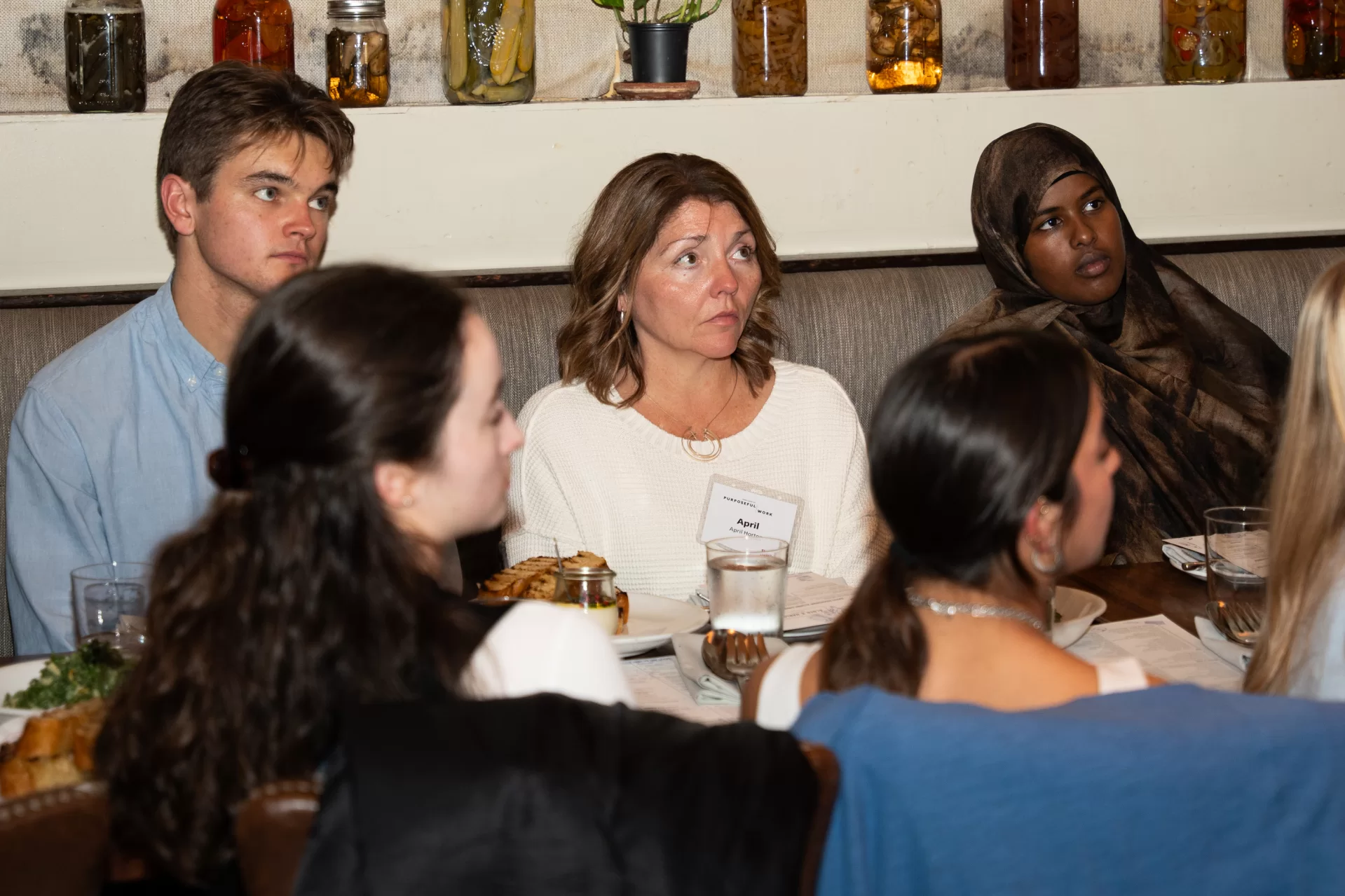
Horton leads Bates’ STEM scholars program, which provides mentoring, coursework, and community to a select cohort of students, including those traditionally underrepresented in science and mathematics. Eight of the students on the biopharmaceutical roadshow were STEM Scholars.
“The STEM Scholars program has been collaborating with Purposeful Work since day one, and to me, this is just an excellent manifestation of what we’re hoping to do, which is help our students understand all the opportunities that they have in this particular industry,” Horton said.
The students got an up-close look at the scientific side of the industry during a laboratory visit at Kymera. Abdisamad, who plans to pursue a scientific career, was intrigued by the laboratory’s robot machinery and advanced centrifuge system.
“It was really, really nice,” Abdisamad said. “Being able to talk to scientists who are working in the lab and go to the lab was really helpful.”
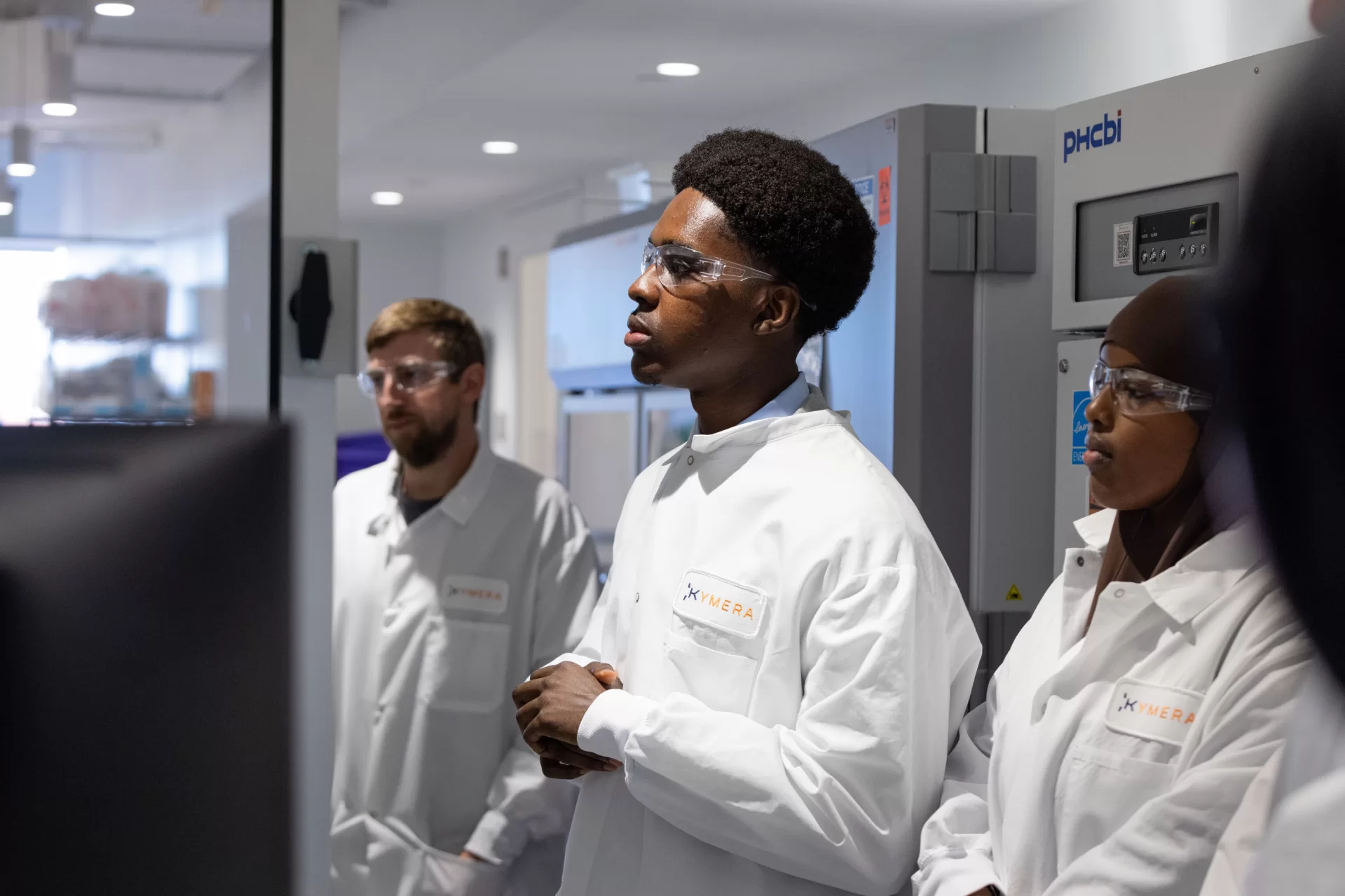
The roadshow also gave students insight into how they may pursue and utilize graduate education. Several alumni working in the biopharmaceutical companies earned MBAs after Bates, which they said greatly helped them in understanding the business side of their companies.
For Dalia Cape ’27 of Mercer Island, Wash., a biology major who completed a summer internship with a Bates alumnus at the University of Washington Foster School of Business, it was exciting to hear about the ways that her business experience may interact with her STEM interests.
“Having some exposure to the strategic thinking of a business school can absolutely be applied to my career in the future, even if it’s more in a science-y field,” Cape said.
At the end of the first day, the students headed to restaurant Alden & Harlow for a dinner with 14 alumni, including Mike Bonney ’80, who worked for over three decades in the biopharmaceutical industry, serving as the CEO of Cubist Pharmaceuticals prior to his retirement in 2014.
Bonney enjoys spending time with students and supporting them as they embark on their career journeys. After all, he began his biopharmaceuticals career as a store manager at Hannaford, a role he was connected with because the CEO of Hannaford was a Bates alumnus.
“Anyone who has had the good fortune to have the success I’ve had has had a hand up along the way multiple times,” Bonney said. “To me, this is just part of paying it forward to provide the benefit of my years of experience.”
During his brief remarks before dinner, Bonney encouraged the students to not be afraid to try new things and to focus on gaining skills rather than securing specific job titles. He shared a bit about his winding career path, which he never anticipated would end in the biopharmaceutical industry, and the stops he made along the way, including a stint as a ski videographer at Sugarloaf Mountain.
“I find that young people today think every decision is going to make or break their whole life,” Bonney said. “Give yourself the room to explore and focus on developing skills and demonstrating skills. Good stuff will happen.”
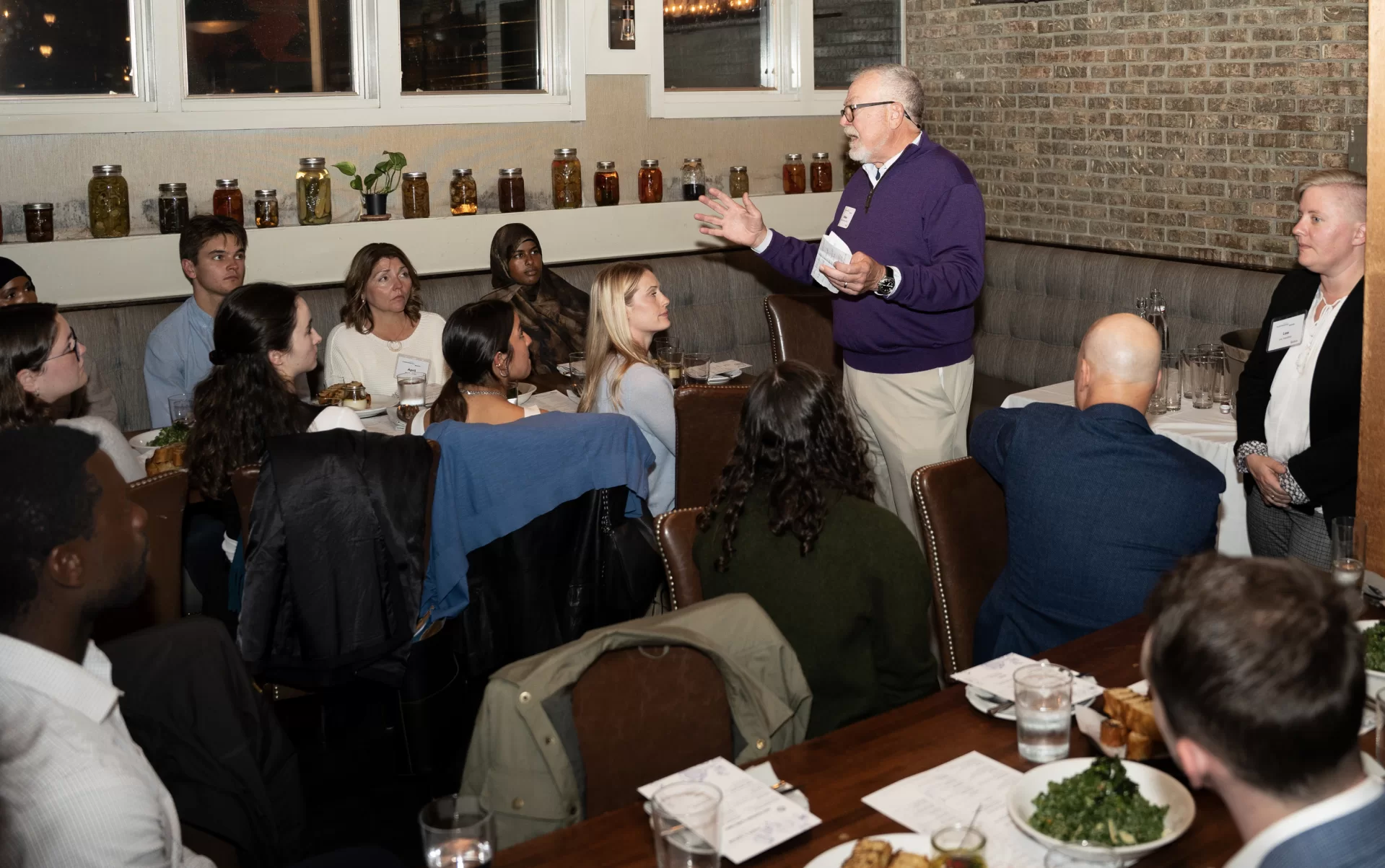
For Brinly Teeple ’28 of Morrisville, Penn., who hasn’t declared her major yet, it was comforting to hear about how alumni found successful careers even when they were initially unsure what they wanted to pursue after Bates.
“That was really reassuring — to hear that decisions that I’m making right now don’t necessarily lock me into a career for the rest of my life,” Teeple said.
Several alumni emphasized the importance of curiosity, which allowed them to explore possibilities and forge unexpected paths, in finding career success.
“They all were lifelong learners,” said Shafin Jubayer ’28, a biology major from Sirajganj, Bangladesh. “They really try to follow their passions, rather than following a traditional pathway.”
Over a family-style dinner, the students and alumni swapped stories about Bates across the decades. Some things, like Bates dining, have changed greatly in the past 20 years, they discovered. Others, like the difficulty of organic chemistry, have not.
“I appreciated being able to engage with alumni and get a sense of how Bates set them on the trajectory that they’re on now,” said Djibril Diaw ’27, a biochemistry major from Mount Hernon, Mass. “It’s helpful to have that roadmap to clarify how we can get to the point we want to get to.”
Faculty Featured
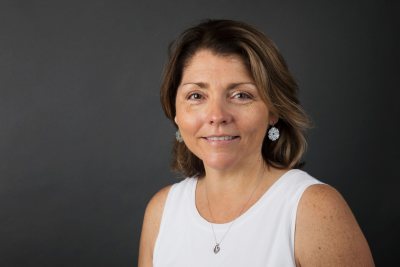
April L. Horton
Wagener Family Professor of Equity and Inclusion in STEM

